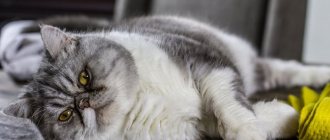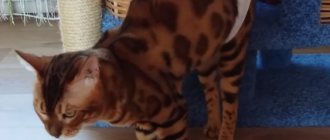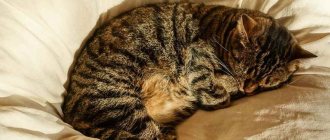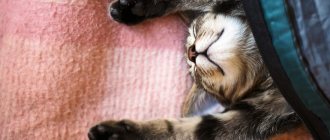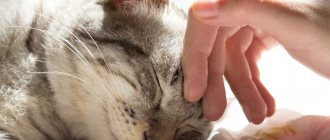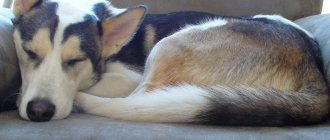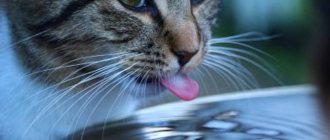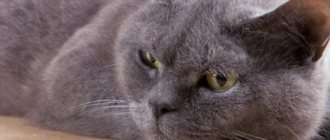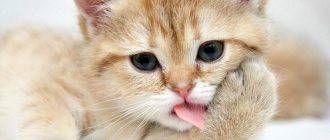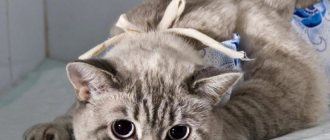What to do if the kitten is lethargic and constantly sleeps?
If your kitten is lethargic and sleeps constantly, there is no need to panic.
A healthy pet sleeps almost the whole day during the first month of life, waking up to eat and play a little. Adult cats are already awake 7-9 hours a day. They spend time playing, hunting and communicating with their owners. A cat may sleep constantly not only because of pain or loss of strength. Factors that influence sleep duration :
- heat, low atmospheric pressure;
- home comfort and calm atmosphere;
- high activity while awake;
- dense feeding of the pet;
- Age: Old cats and young kittens can sleep up to 20 hours a day.
If the kitten is active and eats well when it wakes up, there is no need to worry. Prolonged sleep is physiologically normal, since protein nutrition of animals requires long-term digestion.
Is this always a sign of illness?
The main reason that a cat sleeps very often or constantly is that it actively spends time while awake, which requires significant energy expenditure. A prerequisite for long-term rest is the animal’s nutrition: protein foods require long-term digestion, and this is only possible in a relaxed state. Other causes of prolonged napping include:
- The season of the year or the ambient temperature, for example, in the heat, pets will sleep much longer, due to which thermoregulation is normalized and the risk of overheating is reduced.
- Age – young kittens and older animals need more time to rest.
- The satiety of the animal - the higher it is, the more sleepy the kitten will be.
- Home environment – in a calm and serene environment, cats sleep much longer.
- Health status.
Neutered or overweight animals may rest much longer due to their slower metabolism.
Causes of lethargy
When an animal is sick, it becomes drowsy, aggressive, and lethargic. This condition is immediately noticeable in children, because when nothing bothers them, they love to jump and play.
There are several explanations why a kitten is lethargic.:
- disturbed sleep patterns, when the animal sleeps during the day and plays at night;
- sterilization;
- taking deworming tablets;
- tick bite;
- viral or infectious disease;
- taking antibiotics;
- heat;
- full stomach;
- poisoning;
- concussion.
Any medication, injections and operations can have side effects on the animal’s condition. Often the kitten is lethargic after deworming, which indicates an incorrect dosage or an advanced disease. If your cat feels unwell for more than two days, contact your veterinarian. Gastric lavage may be required.
In addition to the diseases listed, a kitten may be lethargic due to anemia, obesity, poisoning, metabolic disorders, or urolithiasis. A prolonged decrease in the cat's activity, loss of appetite, and avoidance of communication should alert you. You should not give your pet injections or pills yourself, as this may worsen his condition.
After sterilization
In the first days after sterilization, the kitten is lethargic, eats little and sleeps constantly due to lack of strength and the effects of anesthesia. The animal needs to rest and gain strength after the stress it has experienced. Therefore, do not wake your pet, even if you think he needs to eat.
If the condition does not change for two days, you should consult a veterinarian. Perhaps the kitten has increased sensitivity to the components of anesthesia or an infection was introduced during sterilization.
If your cat tries to move and run after surgery, try to help and calm her down . Excessive activity can lead to injury and worsening of the condition.
Why do kittens sleep for a long time?
Any cat owner will confirm that these animals are real sleepyheads, capable of dozing for hours in their favorite place, regardless of the time of day.
On average, these pets sleep 17-19 hours.
And such sleep is beneficial for their body:
- promotes the digestion of protein foods;
- ensures good health;
- maintains the supply of energy necessary for the period of wakefulness.
Babies' sleep. Young kittens also need a lot of sleep, and until 8 weeks of age they sleep almost all the time, waking up only to eat. This period is associated with:
- active growth of the animal;
- strengthening the immune system;
- formation of the nervous system.
By 4-5 months, some of the kittens reach the size of an adult cat. Veterinarians do not recommend preventing a purring pet from sleeping by waking it up or shaking it. These actions can lead to the development of diseases and even death of the pet. If there are no signs of pathology, then you should not disrupt the kitten’s routine.
8-10 weeks after birth, your little pet will get stronger and stay awake longer.
Dangerous symptoms
A kitten that sleeps a lot, does not like to play active games, eats poorly and eats little, may be seriously ill. Pay attention to your pet and the presence of other pathological symptoms. Signs of the disease :
- dry and hot nose;
- refuses to drink;
- temperature, body tremors;
- loose stools;
- vomit;
- pallor of mucous membranes;
- dull coat;
- impaired coordination;
- giving up your favorite treats;
- lack of reaction to people, loud sounds, lights;
- dilated pupils;
- rapid breathing.
Any of the listed symptoms is considered a deviation from the norm. To understand why your pet has stopped playing, eating and drinking, you need to consult a veterinarian.
If you know that the cause of poor health is poisoning, rinse the kitten’s stomach and give activated charcoal. After these steps, go to the veterinary clinic.
- disturbed sleep patterns, when the animal sleeps during the day and plays at night;
- sterilization;
- taking deworming tablets;
- tick bite;
- viral or infectious disease;
- taking antibiotics;
- heat;
- full stomach;
- poisoning;
- concussion.
Alarming symptoms
An apathetic drowsy state is one of the signs of a developing pathological process, but it is always accompanied by additional signs:
- Due to partial or complete lack of appetite, the pet refuses even its favorite dishes and treats.
- The surface of the nose becomes dry and hot, and mucous may be discharged.
- Apathetic state - the cat does not respond to light, sounds, or touches.
- Refusal of water or excessive thirst.
- An increase in body temperature above 40 degrees, which can be seen by the hot tips of the ears.
- Diarrhea or vomiting.
- Pallor of the mucous membranes, deterioration of the coat.
If it is noticed that the kitten is not only constantly sleeping, but is also suffering from one or more alarming symptoms, then it should be immediately shown to a veterinarian. A full professional examination, as well as tests, will help to quickly determine the cause of the atypical behavior and cure the cat.
Why do cats sleep a lot? Why does a cat eat poorly and sleep a lot?
Everyone knows that domestic cats love to sleep. In order to get enough sleep, a typical cat needs at least 16 hours of sleep per day, and some cats need even more. Compared to humans, this pet sleeps most of its life. According to some sources, only possums and bats are ahead of cats in terms of the amount of time they spend sleeping. To this day, the reason why cats sleep a lot is not fully understood. Scientists explain this physiological feature by several probable reasons, most of which are associated with the evolution of the animal.
What affects how long a cat sleeps?
At first glance, it seems that cats are fast asleep, but in fact they wake up from any rustle. The duration of sleep remains the same as it was in cat ancestors. Wild predatory cats rested after a successful hunt, while the body digested food. Modern breeds live about the same way.
Cat sleep includes 2 phases:
- light nap (dream time is half an hour);
- quick deep sleep.
During a nap, the animal lies on its stomach, tucks its paws, ears up or in a ball position. This state is practically no different from the waking state, but less energy is spent. During the period of dozing, breathing slows down, blood circulation and body temperature decrease. But as soon as the animal senses danger, it will immediately jump up, replacing dormancy with an active state. During deep sleep, they relax, rest, and the immune system actively works.
Why do cats sleep so much?
When cats sleep, they move their ears, paws, and meow - this means that they are dreaming. Mustaches have their own biological clocks that work in accordance with time, climate, environment, and health status.
Satiety
If you watch your pet, you will notice that after a hearty lunch or dinner, he goes to bed. After eating, cats need rest. At rest, food is digested and the animal gains new strength. When the diet contains more protein and meat, the animal sleeps for a long time, peacefully. With insufficient calorie food, the pet has to wake up and eat more often. The kitten sleeps a lot, this is normal, because they wake up only to drink their mother’s milk.
Fatigue
Animals expend a lot of energy during the day. Games and hunting require a lot of energy and stamina. Tired of running around, the cat needs to stock up on energy, so he falls asleep. An older pet gets more tired.
Age
Does the kitten sleep all the time? - That's how it should be. Sleep at their age is 22-23 hours. They wake up to eat. At 1 month, kittens begin to be active, play, and explore the world around them. Sleep is reduced and ranges from 21 to 22 hours. Over time, rest hours decrease. One-year-old cats are more awake and have less time to sleep. On average, pets sleep from 14 to 20 hours, the duration varies from person to person. After 8 years, changes occur, the duration of sleep increases. If the pet is no longer small, then it still sleeps more than 20 hours a day, do not panic.
Breed
The duration of sleep also depends on the breed. How different cat breeds sleep:
- Scottish and British cats are able to fall asleep after eating;
- Abyssinians are an active breed and their representatives love to play with their owner. Everything is determined by the characteristics of temperament. Most of the time they are active;
- Egyptian Mau, Bengal cats are active and sleep 14 hours a day;
- Persian cats are lazy, lethargic, phlegmatic. Most of the time they are drowsy, often dozing;
- Siamese cats are constantly tense and relax for a short time;
- Sphynxes, Devon Rexes - need attention, care and are ready to sleep all day long.
Important! The cat sleeps all the time, this is normal. A cat, like a person, needs time to rest to restore its energy supply.
Predation as a way of life
The nature of cats is designed in such a way that all of them, regardless of species, were and remain predatory animals. Domestic cats are also no exception. However, at present they have lost many of the behavioral features characteristic of predators that were acquired during the process of evolution.
As a predatory animal, a cat is most active when its prey is awake, that is, at dawn and sunset. The rest of the time she needs to sleep and recuperate, which explains why cats sleep a lot. To lead a predatory lifestyle, an animal needs to accumulate as much energy as possible, which would ensure a successful outcome of the hunt. For this reason, in the process of evolutionary development, cats acquired the ability to accumulate maximum energy in order to use it when necessary, increasing the likelihood of a successful completion of the hunt.
Sleepiness due to boredom
Why do cats sleep often? It is likely that pets like to sleep because they simply have nothing to do. Cats are quite curious animals and they seek out different experiences. Spending their lives in a house where the furnishings remain virtually unchanged, cats begin to experience boredom. Even if the owners are at home, they do not always have the time and desire to entertain the pet. To make your cat sleep less, try entertaining her. At the same time, do not forget that she should spend most of her time sleeping, because this is how nature intended.
How cats sleep
Like humans, cats' sleep is divided into 2 phases: deep and superficial.
We recommend reading: Discharge in a Dog from a Loop
Shallow sleep lasts from 15 minutes to 1.5 hours. During this period, the cat keeps its body under control so that at any moment it can jump up and run away or attack itself.
The duration of deep sleep, as a rule, is about 5 minutes, and the cat cannot quickly get out of this state. The deep sleep phase is replaced by drowsiness, and this alternation continues until the animal wakes up.
If you count the time it takes for deep sleep, it turns out that cats don’t sleep that much. In other words, cats spend most of their time half asleep.
The cat constantly sleeps and is lethargic: normal or pathological
Long rest and lack of appetite to a certain extent are normal. If the cat has had a heavy dinner, he becomes drowsy. The normal duration of rest per day is 12-14 hours or more.
The cat does not have sweat glands, and cooling through an open mouth is not typical. Therefore, in hot weather, the pet protects itself from overheating by reducing muscle activity, and also stops consuming calories through food. A fruitful mating has a calming effect on the female, and she prefers to sleep.
At the beginning of pregnancy, a cat, like a woman, experiences toxicosis while the signs are still invisible. Protection against illness is fasting and sleep. In older pets and individuals with a phlegmatic psyche, idleness and poor appetite are normal.
The norm is considered to be drug-induced inhibition after taking sedatives or antihistamines, as well as the condition after surgery.
The cat owner should be alert to additional symptoms:
- the desire to hide in a dark corner;
- the pet stops licking itself or does it too often;
- diarrhea and (or) vomiting develops;
- shortness of breath, cough, discharge from the nose or eyes occurs;
- muscle tremors appear;
- increase in body temperature or drop below normal;
- gums lose color.
Be sure to read:
One of the cat’s eyes is watering: reasons, what to do at home, medications and folk methods
If fasting and lethargy continue for more than two days, you need to see a veterinarian. Lack of appetite accompanied by cessation of drinking is a dangerous symptom.
Weather influence
It's no secret that the weather directly affects the behavior of cats. Of course, their activity depends on many factors. This includes age, breed, temperament, as well as health status. But it is a fact that dreary, rainy weather explains why cats sleep a lot. It should be taken into account that cat sleep should not exceed 80% of the time. For small kittens, sleep duration up to 90% of the day is considered normal. Longer sleep, as a rule, signals that the animal has health problems.
Why is my cat lethargic and sleeps a lot?
Lethargy and drowsiness are a sign of many diseases. Since each cat's temperament is different, no veterinarian can determine whether the animal is in normal condition. Only an owner who knows his pet well can do this. The cause of lethargy may be quite natural. For example, it could be:
- fatigue;
- hot weather;
- postoperative period;
- taking certain medications;
- pregnancy;
- old age of the animal.
The cat is lethargic and sleeps all the time: what is the reason?
Among the pathological causes of lethargy are the following:
- poisoning,
- hormonal disorders after childbirth or as a result of using contraceptives,
- side effects of corticosteroid anti-inflammatory drugs,
- musculoskeletal pathologies,
- infectious diseases,
- worms;
- anemia;
- hypovitaminosis;
- tumors;
- chronic diseases.
Stress causes ambivalence in cats. The pet may become sleepy or, conversely, show aggression.
How to tell if a cat is sick
If your pet is sick, in most cases other symptoms will accompany lethargy and drowsiness. As a rule, the presence of a disease can be determined based on the following signs:
- the animal hides from everyone;
- eats little;
- doesn't drink water;
- does not care for the coat;
- behaves aggressively;
- breathing problems;
- vomit;
- diarrhea;
- fever;
- pale gums.
If you notice unexplained drowsiness and lethargy in your cat, which is also accompanied by the above-mentioned symptoms, you need to take the animal to the veterinarian as soon as possible.
When a cat's condition should cause alarm
The owner of the animal should be wary of prolonged fasting. For kittens the critical period is one day, for older pets - 2; cats for three days. An alarming sign is refusal to drink, a drop in temperature below normal, and excessive salivation.
Be sure to read:
The cat doesn’t eat, only drinks water, is lethargic: reasons for what to do if he refuses to eat and sleeps
In such situations, emergency veterinary care is required.
Possible diseases associated with excessive sleepiness
The topic “Why does a cat eat poorly and sleep a lot?” is often discussed on Internet forums. As it turns out, often lack of appetite and constant dozing can be associated with infectious diseases, in particular worms. To prevent your pet from losing weight and becoming lethargic, it needs to be given anthelmintic drugs from time to time.
Drowsiness can also be caused by diseases of the gastrointestinal tract. In most cases, this condition is accompanied by diarrhea and other abnormal discharge.
Kidney failure is another equally common cause of loss of appetite and lethargy in a cat. Self-medication in this case is unacceptable. If the animal is not taken to a doctor soon, the situation could end tragically. Timely diagnosis and treatment will help save your pet, so there is no need to hesitate.
Also, excessive sleepiness and refusal to eat may indicate liver problems. In this case, it is necessary to visit a veterinarian, who will prescribe treatment aimed at cleansing the organ.
In addition, the cause of reduced activity of a pet can be diseases of the pancreas, reproductive system, blood, hypothyroidism, diabetes, purulent endometritis, colds and others.
As you can see, the reasons why a cat eats little and sleeps a lot may be far from harmless. Therefore, if you suspect an illness, you should immediately seek help from a veterinarian, who can make the correct diagnosis and prescribe appropriate treatment for your pet.
- the animal hides from everyone;
- eats little;
- doesn't drink water;
- does not care for the coat;
- behaves aggressively;
- breathing problems;
- vomit;
- diarrhea;
- fever;
- pale gums.
If the cat is lethargic, does not eat or drink: what to do?
If the animal does not eat or drink, then there is a reason that causes vomiting. If toxic substances appear in the gastrointestinal tract, the body gets rid of them, first of all, through diarrhea and vomiting. This scenario develops in case of poisoning or infectious diseases.
When the intestinal lumen is clogged with bones, hairballs, and helminth balls, there is only one way to get rid of poisons - through the mouth. An attempt to eat or drink something is stopped reflexively and vomiting occurs. Therefore, food and water intake is stopped.
When your pet is not eating or drinking and an appointment with the veterinarian is postponed, it is necessary to protect him from dehydration. The owner of the cat is able to independently inject him with Ringer-Locke solution or saline solution subcutaneously in unlimited quantities. Use syringes of 5 or 10 ml. After the injection, an accumulation of fluid is formed, which quickly resolves. Water should not be used for injection, it causes pain.
You should not treat your cat yourself. There is a high risk of compromising health and creating problems for the veterinarian during diagnosis.
An overview of the causes of lethargy, drowsiness and poor appetite in cats
Cats are active creatures and need a lot of sleep to recuperate. A well-fed, healthy cat can be dormant for 12–20 hours a day. Sometimes drowsiness is combined with lethargy and other signs of ill health. A cat, like its owner, has days when it is sad. The bad day passes and the cat is happy and healthy again. But, if drowsiness lasts for several days, the fellinologist is obliged to show maximum attention to the pet. It is possible that the pet is suffering from some kind of hidden illness. It is necessary to record everything that happens to the pet in writing, so that when applying for veterinary help, you will be able to answer the diagnostician’s questions.
A sign that a cat is sick is a combination of drowsiness with additional symptoms:
- The nose is constantly dry.
- Hyperthermia.
- Loss of appetite.
- Diarrhea.
- Vomit.
- Exhaustion.
- The stomach is swollen.
- A pitiful look, eyes watering.
- The third eyelid becomes noticeable.
- The cat sneezes and coughs.
- The cat stopped licking himself.
- The animal is limping.
The following are the causes of diseases accompanied by increased drowsiness:
- Rhinotracheitis.
- Leukemia.
- Urolithiasis disease.
- Diabetes.
- Panleukopenia.
- Coronavirus peritonitis.
- Worms.
Rhinotracheitis
An extremely contagious infection, symptoms resemble those of human influenza. In addition to drowsiness, cough, runny nose, lacrimation, and hyperthermia are observed. Immunomodulators and symptomatic agents that eliminate the above symptoms are used. The most dangerous are conjunctivitis, leading to loss of vision. Prevention consists of regular immunization of the animal.
Caused by a retrovirus. The hematopoietic system is affected. The body is defenseless against all kinds of contagions. Hyperthermia, anemia, and respiratory diseases develop. When kept in crowded conditions, the disease spreads quickly. Specific treatment is ineffective. Symptomatic remedies can prolong the life of a pet. Timely immunization helps protect your cat from the disease.
Urolithiasis disease
The first signs are subtle. Activity decreases, appetite disappears, and discomfort occurs when urinating. The state of health worsens gradually:
- The abdomen becomes bloated and painful.
- When urinating, the animal is in pain, the cat meows pitifully.
- Demonstrative urination begins anywhere.
- Hematuria is manifested by pink discoloration of urine.
Blockage of the urethra by stones is characterized by vomiting, convulsions, cessation of nutrition, and possible rupture of the bladder. In such situations, surgical intervention is required. Treatment involves alleviating the animal's suffering and prolonging its life.
Diabetes
Mostly obese older animals suffer. The disease is characterized by high glucose concentrations. To dilute the blood, the cat constantly drinks. Another way to eliminate excess sugar is to urinate frequently. Since the tissues do not absorb glucose, they require additional nutrition, which is manifested by gluttony. At the same time, the cat begins to gradually lose weight.
The fur becomes disheveled and falls out. For therapeutic purposes, a special diet is used. A veterinarian caring for a sick cat will have to learn how to administer insulin and do so throughout life at intervals determined by the veterinarian.
- Constipation alternates with diarrhea.
- Unsteady gait.
- Regurgitation with balls of helminths.
- Conjunctivitis.
- Anal itching.
- The stomach is bloated.
- Impurities of blood, mucus, fragments of helminths or whole individuals are found in the feces.
- Cough. Roundworm larvae injure the lungs.
- Allergic reactions.
- The fur becomes dull and falls out.
- Appetite increases and body weight decreases.
We recommend reading: Interval of contractions before giving birth in a cat
Antihelminthic drugs are used for treatment.
Panleukopenia
A dangerous disease with high mortality. The causative agent is parvovirus. Young and old cats suffer. Animals become infected through the bites of blood-sucking arthropods, as well as through the oral route. First, the virus attacks the bone marrow, leukopoiesis is disrupted, and panleukopenia occurs. When the contagion becomes scarce in food, it moves into the intestines, causing enteritis.
Among the many signs of the disease are the following:
- Loss of appetite.
- Refusal to drink.
- Hyperthermia followed by hypothermia.
- Vomit.
- Diarrhea.
- Blue gums.
- Cardiac pathologies.
- Rhinitis.
- Conjunctivitis.
The treatment concept includes the following areas:
- Antiviral therapy.
- Symptoms:
- Fighting dehydration.
- Antimicrobial therapy.
- General strengthening drugs.
- Restoration of digestion.
Prevention of the disease is timely vaccination.
Coronavirus peritonitis
This pathology is rare when kept individually. Nursery residents get sick more often. Weakened animals suffer from prolonged diarrhea, which results in mutation of the virus and the development of symptoms of coronavirus peritonitis:
- The state of depression intensifies.
- The cat is losing weight.
- Anemia develops, manifested in pallor of the mucous membranes.
- Vision is impaired.
- A pyogranuloma is formed.
- Ascites or pleurisy occurs.
- The liver and kidneys are affected.
- The pathogen acts on the nervous system, causing convulsions.
- The cat tends to hide in a dark place.
A positive treatment result is achieved by using anti-inflammatory drugs, as well as immunocorrectors.
- Antiviral therapy.
- Symptoms:
- Fighting dehydration.
- Antimicrobial therapy.
- General strengthening drugs.
- Restoration of digestion.
Causes of lethargy and weakness in cats
Cats spend a lot of time sleeping, but not all of them, and it won’t be difficult for an attentive owner to notice changes in the pet’s behavior. If the animal had the habit of frolicking from time to time, running from room to room, actively pouncing on treats and coming to the owner’s lap to be petted, then diametrically opposite behavior should alert the owner.
Signs to look out for:
the cat chooses tasty pieces, leaves the rest on the plate or has completely lost interest in food;
the cat does not drink water;
the upper edge of the ear may feel hot to the touch;
the animal's nose is dry;
any toys are forgotten, the animal prefers to lie down;
the cat becomes uncomfortable with the affection: the animal leaves, shows signs of irritation, the skin of its back twitches nervously;
does not respond to his name;
the animal tries to hide from people in a quiet, secluded place and practically does not leave there.
This behavior, if it lasts more than a day, requires special attention from the owner and a visit to the veterinary clinic.
There can be many reasons for lethargy. Not all of them are signs of problems in the animal’s body.
Let's consider situations in which lethargy in a cat is not a symptom of illness:
- Bad mood. It happens to everyone, including cats. An animal may harbor a grudge against one of the family members if they did not play with it, changed its bedding, or removed its favorite post for scratching its claws. But this condition does not last long and does not need correction. As a rule, the cat returns to its normal state within 24 hours.
- Change of weather. Some cats can react to the weather. In this case, their depression is temporary, does not last more than 12-24 hours, and goes away on its own when the weather improves. But these conditions are repeated, and the owner may notice the periodicity and connection with natural phenomena.
- Unneutered cats taking the pills may become depressed. At the same time, a loving owner can see how spoiled their mood is: they are gloomy, lethargic, eat less and react irritably to attempts to pet them, and do not want to play.
- Cats may not cope well with a change of home or the departure of their owner. In this case, the animal may develop deep depression. As a result, the cat will hide under the sofa or closet, refuse food and even growl if you try to give it something to drink or eat. This condition can last for several days.
If the apathetic state is not associated with external changes in the pet’s lifestyle, it does not go away for more than a day and is accompanied by other unpleasant symptoms, then most likely you cannot do without consulting a specialist.
Almost any somatic disease (pathology of internal organs caused by external or internal factors not related to the animal’s psyche) can be accompanied by lethargy and weakness. In this case, the animal stops eating, meows pitifully, vomits, or develops diarrhea, it swells, gets fat or loses weight. In short, there are other symptoms that look more alarming than refusal to play or lack of desire to sit on the owner’s lap. But there are situations when, apart from the animal’s apathy and its reluctance to move and respond to its name, there are no symptoms, should the owner worry in this case?
If the owner has not noticed any pattern, lethargy haunts the animal for more than a day, it is worth taking the animal to the veterinarian. If this cannot be done right away, you can try to examine the pet yourself. Measure his body temperature. A high temperature may be a sign of an incipient infectious disease or hormonal disorder.
Lethargy can occur with the following diseases:
You can feel the cat’s stomach; perhaps the animal has swallowed an object, is constipated, or has parasites actively multiplying. These conditions are not always accompanied by vomiting or acute constipation (diarrhea), but the stomach will be tight, the abdominal wall will be tense and painful. At the same time, the belly becomes round like a ball, and the cat loses weight, the sparkle in the eyes disappears. The animal refuses to eat, may meow loudly and pitifully, and lick itself excessively.
Bites from fleas, ticks, bees and other insects. A large number of fleas tires the cat, she constantly itches and licks herself. If a tick has attached itself to an animal, the condition will worsen progressively. A bee sting can be fatal to a cat if the bee leaves a sting in the mouth. From increasing swelling, the animal can simply suffocate. And for a cat with a small weight, the poison from a bee sting is enough to cause serious poisoning. Therefore, if you notice a tick on your cat’s body or swelling from a bite, you should urgently show it to specialists.
Abrasions, wound opening. If the animal has become lethargic, it is worth examining its body: perhaps an old abrasion has become inflamed. Often lethargy in street animals appears after bites that occurred, for example, during a fight or from a dog attack.
Poisoning. It is commonly believed that only an outdoor cat can get poisoned. But that's not true. Even a domestic cat can catch a mouse that has eaten poison. In addition, poisoning can occur due to expired food, and even ordinary expired food. By the way, food that is highly discouraged from feeding a cat can also cause symptoms of poisoning. These are primarily citruses, chocolate, tomatoes.
Stones in the kidneys, bladder. In addition to weakness, one should be alerted by the fact that the animal does not go to the toilet for a long time, meows pitifully and makes it clear that it is in great pain.
Endocrine disorders and malignant neoplasms. If the owner knows the weight of his animal, the cat can be weighed. Excessive weight gain or loss may be evidence of endocrine disorders (diabetes mellitus, thyroid dysfunction) or the growth of a malignant neoplasm. You need to pay attention to the quality of the wool, whether it is too much, whether it has become thin, or whether it is losing its shine. Are there any crusts or scratches in the croup area?
General swelling is sometimes difficult to detect. If isolated edema (especially if one limb is swollen) is easy to notice by comparing its size with the other limb of the animal, then general edema can be missed. With swelling, the elasticity of the skin and subcutaneous layer decreases. An owner who has frequently petted an animal may notice tension in the tissue. Swelling is a sign of a serious illness; the animal must be shown to a specialist.
Diseases of the gastrointestinal tract. If a cat hides under the bed or tries to climb into another hard-to-reach place, refuses water or food, this means the animal is very ill and must be taken to the hospital without delay. In addition to examining the animal itself, you need to pay attention to the cat’s stool (quality, presence of foreign inclusions or undigested lumps of food, smell and color), urine (frequency of urination, painlessness, clarity of urine, absence of impurities, color, smell). Any changes may indicate serious problems with the animal’s health (gastritis, ulcers, colitis, pancreatitis, hepatitis, glomerulonephritis, poisoning, allergies, etc.).
Useful materials:
- Cutaneous horn General description of the disease Cutaneous horn on the forehead or face (ICD 10 code - L57.0) -...
- Itching and odorless discharge Main causesBefore considering the factors that provoke the appearance of discharge that has a sour odor, it is necessary to immediately note...
- Normal temperature in animals Normal temperature in different types of animals Veterinary services Day hospital for animals Veterinary certificates Vaccination…
- Cat with slanted eyes Basic information As is known, strabismus is a phenomenon in which the eyes seem to be slanted towards the nose or...
What to do if the cat is lethargic after sterilization and sleeps a lot?
Many cats during the period of heat begin to behave inappropriately; they can rub against the legs of their owners or their guests, purr or loudly shout “wedding songs,” and also mark their territory by spraying their own urine in order to attract the attention of cats. This behavior of pets does not bring joy to their owners, so many see a way out of the situation in sterilizing the animal.
The operation is simple, its duration rarely exceeds a quarter of an hour, and the risk to the cat’s life is minimal. But still, do not forget that sterilization is a surgical intervention, so after it is carried out, the cat needs to be given attention and provided with competent care.
It is important to properly care for your cat after sterilization.
Postoperative care
As a rule, during the sterilization of cats, specialists use gas anesthesia. Despite the fact that animals tolerate it quite easily, after the operation is completed, pets need some time during which they will “recover” from anesthesia.
The effect of anesthesia manifests itself in impaired coordination of movements, so the cat should be placed in its usual resting place and its communication with other pets or children should be limited.
During the period when the cat recovers from anesthesia, which lasts about a day, the pet should not be placed on high surfaces. Impaired coordination of movements can lead to the animal falling from a height. It is recommended to lay a diaper in the cat's resting place, which will protect the bedding in case of possible attacks of vomiting.
Place a bedding on the floor, possibly near the radiator
Cat behavior during recovery from anesthesia
During recovery from anesthesia, the cat sleeps most of the time. After waking up, the owners may notice lethargy in the pet’s movements, an uncertain, unsteady gait caused by general weakness of the body (see what a cat’s behavior should be after sterilization).
There is no need to worry, as this is a normal course of the process of coming out of a drug-induced state. During this period, it is necessary to carefully monitor the pet, do not allow it to hide or climb too high.
It is not recommended to feed the cat on the first day after the operation, but the animal needs clean drinking water. You can switch to a traditional diet only after the pet has finally recovered from the effects of sterilization. At first, the food should be light, its quantity small. Otherwise, constipation will have to be treated. If the animal does not want to eat, you should not try to force feed it.
It is very common for cats to tremble after sterilization. In this case, there is also no need to worry, since trembling is a consequence of a violation of the body’s thermoregulation caused by surgical intervention.
The owner of the animal must arrange for it to rest in a warm place, cover it with a blanket and place a bowl of warm water in the resting place.
Features of long sleep in kittens
Many pet owners know that cats are real sleepyheads and spend most of their time sleeping in a secluded place. This is a characteristic habit of animals accustomed to hunting at night. Domesticated cats do not require the constant vigilance of their wild relatives, so they can spend up to 18 hours sleeping every day. This behavior allows them to fully digest the protein food they eat, and also maintains health and saves energy for the active period of wakefulness.
If a small kitten sleeps constantly, the reasons may be different. It is normal for healthy newborn kittens and cubs under two months of age to sleep almost constantly. In the earliest stages of growing up, during sleep, accelerated growth of the animal’s body and strengthening of the nervous and immune systems are observed.
Already at four months of age, some kittens reach the size of adult animals. Such intensive development requires a lot of strength and energy, so the kitten may constantly feel drowsy and must be at rest. Under no circumstances should a small pet be prevented from getting enough sleep, or should be woken up or disturbed, as this can cause illness and even the death of the baby.
If the animal does not show any signs of illness, there is no need to interfere with the natural development process. Within a few weeks, the kitten will feel stronger and more confident for more active pastime.
Seam care rules
Many pets are bothered by the stitch, so they try to get rid of it by licking and scratching the wound. The owners must stop such attempts immediately. The fact is that in the claws and saliva of animals there are many different bacteria that can provoke one or another infectious disease.
It is necessary to ensure that the cat does not touch the wound, but it is better to cover this area with a blanket or a special bandage. The dressing must be changed periodically. If you use blankets, there should be two of them so that one of them can be washed in a timely manner. If the suture causes great discomfort to the animal, a special collar or bandage will help limit access to the wound. The postoperative suture heals quite quickly.
The bandage can be purchased at any veterinary pharmacy
As a rule, on the third day the wound is no longer noticeable, and after another week the skin in this place is completely restored.
The seam must be periodically treated with antiseptic agents. If inflammation, crusting, redness or swelling occurs, take your pet to a specialist immediately. He will eliminate negative manifestations and provide recommendations regarding proper care of the postoperative suture.
Also, the veterinarian may prescribe the following medications:
- antibiotics when the animal scratches or licks a wound;
- special medicinal ointments for the skin to prevent itching;
- hemostatic drugs in case of slow blood clotting;
- vitamins that will allow your pet to regain its former strength and mobility in a short time.
Features of feeding
At the end of the rehabilitation period, the animal becomes completely healthy, which means that its diet should be the same as before the operation. Very often, a sterilized cat begins to eat more than usual, as a result of which she quickly gains weight. The owner should pay attention to this and limit the intake of smoked, fatty, salty foods, as well as pasta, beans, fish and bread.
Obesity of a cat after sterilization
To prevent constipation, dry food offered to your pet should be pre-soaked. To prevent your cat from gaining excess weight, you need to play with it more than before.
What could be the consequences of sterilization?
If the operation was performed by highly qualified specialists, there will be no negative consequences. However, it is impossible to completely predict the cat’s body’s reaction to such surgery. There are cases of unnatural lethargy or, conversely, increased aggressiveness of sterilized animals.
Sometimes sterilization does not relieve the cat from estrus, which in exceptional cases can even lead to conception and subsequent birth. However, this happens extremely rarely. If your pet has poor appetite, metabolic disorders, or weakness, you must contact a veterinarian who will prescribe a set of therapeutic treatments.
If this is not done on time, the animal may develop quite serious chronic diseases.
Video: Caring for a cat in the first days after sterilization
In some overly active animals, the suture may rupture, which will lead to an incisional hernia. The lump that appears does not pose a risk to the health of the pet, but still, it is better to take the animal to the veterinarian.
Many cats during the period of heat begin to behave inappropriately; they can rub against the legs of their owners or their guests, purr or loudly shout “wedding songs,” and also mark their territory by spraying their own urine in order to attract the attention of cats. This behavior of pets does not bring joy to their owners, so many see a way out of the situation in sterilizing the animal.
If a cat lies all day, refuses water and food, and does not want to play, this frightens any normal owner. It is difficult to imagine that your pet is in a bad mood, experiencing an attack of depression or laziness. What is the reason that the animal is lethargic and can it be helped?
We recommend reading: Anthelmintic For Dogs Drontal
Why is the cat lethargic and does not eat what to do
Lack of appetite and lethargy are sometimes caused by stress. If, for example, a beloved owner went on a business trip or vacation, leaving the cat in a cat hotel, or the family moved to a new home. Only patience and affection will help here.
Lack of appetite and lethargy may be a sign of illness. If a cat behaves strangely, measure its temperature (normal is 38 degrees), examine its ears, fur, and body.
The cat is lethargic, sleeps all the time, hardly eats, what is it and how can I help?
You cannot force a cat to eat. If your cat is lethargic for several days, take him to the vet. Get your cat tested, undergo an examination, and the doctor will prescribe the correct treatment. It is impossible to give medicine for worms yourself when the animal is not feeling well, it will only bring harm.
If the cat is lethargic and sleeps a lot and doesn’t eat and his nose is dry, what’s wrong with him?
Many cats have dry noses after sleeping. But if the nose is dry all the time, and the cat is lethargic, this may be a sign of illness. Unfortunately, the cat cannot tell what is hurting him; the owner can guess this only by indirect signs. The cat sometimes licks the sore spot more thoroughly. It is difficult to say how to treat without an accurate diagnosis.
There can be a great variety of diseases in cats, and treatment for diabetes will be very different from treatment for oncology or liver disease.
The cat is lethargic, does not eat, does not drink, lies in one position, what treatment is needed at home?
First, try to find out the diagnosis of your dog’s disease at a veterinary clinic. Maybe she just doesn't like the new food? Buy tasty wet food that your cat loves, and this will restore her appetite and strength. If not, then hurry to the veterinarian.
Why is the kitten lethargic after deworming?
It is very important to correctly calculate the dose of medication when deworming. Many anthelmintics are toxic and can cause harm if the recommended dose is exceeded. Give the kitten attractive food, introduce vitamins and immunomodulators into the diet. Everything will return to normal.
Why is a cat lethargic after castration, deworming pills, injections, vaccinations, tick bites, antibiotics?
Castration is a surgical operation, it is stressful for the animal, so a lethargic state in the first days is quite normal. If your cat refuses to eat for more than two days, you should take him to a veterinary clinic for an examination.
Anti-worming tablets, injections, vaccinations, antibiotics put a strain on the cat’s liver and disrupt the microflora in its intestines. After antibiotics, a course of vitamins with probiotics is necessary. A tick bite can cause serious diseases in a cat, one of which is piroplasmosis. If left untreated in the first days, death is possible.
Lethargic cat after sterilization and poor appetite, what is the reason?
Cats are all different, just like people. Some recover quickly from anesthesia, but most animals remain lethargic and refuse to eat on the first day after surgery. There is nothing wrong with this if your appetite returns in the coming days. Remember that at first the cat must be fed liquid food, ground and low-fat (cottage cheese with kefir, low-fat broth without meat, wet industrial food, etc.)
The cat is lethargic and drools all day, what is this?
A cat may have excessive salivation due to chlamydia, rabies and some other diseases. Only a veterinarian can make a diagnosis. A cat with rabies will behave aggressively. With chlamydia, serous fluid is released from the animal's eyes. Sometimes a doctor can make a diagnosis only after tests in a clinic.
The cat is lethargic in the heat, how to help
Even short-haired cats suffer from extreme heat, let alone long-haired pets. Try brushing your cat with a furminator. If you have never done this before, you will be very surprised at how much hair you can comb out from one cat. Also, in hot weather, the cat should always have clean water in the drinking bowl so that he can drink as much as he wants.
If the kitten is lethargic and trembling, lethargic, what is it and how to treat it
The kitten may have: - a viral or bacterial infection; - concussion; - worms; - poisoning, etc.
Shivering is most likely a sign of a high fever. How to treat depends on the disease; only a veterinarian can determine this. If the kitten does not eat or drink, you can inject about 60 ml of saline solution into the withers twice (30 ml in the morning and 30 ml in the evening). You cannot give deworming medicine to a weakened animal yourself.
comments 3
- 3 Comments
- 0 Trackbacks & Pingbacks
the kitten eats poop and is lethargic, we took him from the street into a pack of 4 of our cats, at first we didn’t notice anything like that about him, but after we wormed him, his face was covered in poop and his paws too. At the veterinary hospital they took my temperature and it was normal.
A cat may have excessive salivation due to chlamydia, rabies and some other diseases. Only a veterinarian can make a diagnosis. A cat with rabies will behave aggressively. With chlamydia, serous fluid is released from the animal's eyes. Sometimes a doctor can make a diagnosis only after tests in a clinic.
